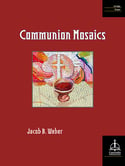My husband and I recently received a little toy piano for our daughter. It is the perfect size for her. She sits on the floor and bangs the keys with her little fists, squealing in delight as the acoustic piano plinks out various clashing chords.
Many people have told us that her current age is perfect to begin introducing instruments.
“Does she bang things together?” her pediatrician asked at our last appointment. It is spoken of as an important developmental stage. Babies are supposed to find the sounds they can create with anything they can get their hands on fascinating and fun.
While the sounds babies create with these objects could be classified more as “noise” than “music,” the delight they take in making these sounds speaks to an innate human pleasure for music. Most of the time, the sounds and harmonies—the music—of the physical world are a great pleasure to us. Music can draw us beyond this world.
Music Drawing Us to the Divine
The natural delight we take in music demonstrates a divine experience of a physical thing. All sounds, including those we would classify as music, are comprised of sound waves. It’s why your side-view mirrors shake when the car sitting at the red light next to you has its bass turned up. It’s why you can feel your vocal cords vibrating when you hum or talk or sing. It’s why brass players need to buzz their lips when blowing into their mouthpieces. These vibrations cause or are caused by oscillating sound waves that create music. These sound waves are physical realities.
The physicality of music brings us beyond the physical to the divine. Consider how one may be moved by a particularly beautiful melody or how the tense music in a scary movie has us sitting on edge. This physical reality is capable of bringing us beyond the earthly life we live to something harder to explain scientifically. It can touch our emotions. But it goes beyond that to express an unseen reality.
Language Drawing Us to the Divine
Language can do the same thing. A physical page of black ink piques our imagination, touches our emotions, and, as good literature does, transports us to a reality that is not physically laid out for us. It causes us to consider why things are the way they are, particularly in human affairs. Why is it wrong for one character to murder another? Why should the heroine choose that man over another man to be her husband? Why did that soldier carry out his duty to death when he could have easily saved himself?
Physicality and the Divine in the Divine Service
In the Divine Service, we see the physical realities of music and language combine to point us beyond our earthly lives. The physical is essential. We are bodies as well as souls. You cannot have music without sound waves. You cannot create an enduring language without the written word. But then the physical brings us to the divine. The language of the liturgy tells us that God has given us every good thing and that we are living our earthly lives in order to love and serve God and our neighbor. The music gives delight to the language, embodying the fact that this purpose for our lives is good.
Finally, we reach the pinnacle of the Divine Service in Holy Communion where God takes physical matter and transforms it into our salvation. Christ’s body and blood are present in, with, and under the bread and wine. In His utmost love for His people, God gives us what we need most: physical matter that brings us the divine. We cannot explain it scientifically. We are consuming bread and wine and the body and blood of our Savior for our salvation. We taste the bread and the wine, and we see the bread and the wine, and it is these elements that God uses to bring us into communion with Him. God uses these common physical elements to draw us into divine eternal life with Him.
And that is something to bang things together and squeal in delight about.
 Share the beautiful joy of Holy Communion with others with these settings for organ by Jacob Weber.
Share the beautiful joy of Holy Communion with others with these settings for organ by Jacob Weber.
























